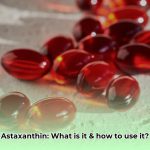Astaxanthin, the vibrant red pigment found in salmon and other seafood, is more than just a color enhancer. It’s a potent antioxidant with a wide range of potential health benefits, from protecting your skin to possibly supporting heart health. This comprehensive guide explores the science behind astaxanthin, its potential benefits, recommended dosage, and important precautions.
Understanding Astaxanthin
Astaxanthin is a carotenoid, a type of natural pigment found in various organisms like algae, salmon, krill, and shrimp. It acts as a natural sunscreen for these organisms, shielding them from the sun’s harmful rays. This protective power translates to potential benefits for humans as well, acting as a powerful antioxidant that may combat free radicals, unstable molecules that contribute to aging and various health issues.
Potential Benefits of Astaxanthin
Astaxanthin is linked to a variety of potential health benefits, many of which are supported by scientific research. However, it’s important to remember that research is ongoing, and more studies are often needed to confirm these findings.
Skin Health
Astaxanthin may protect against sun damage, potentially reducing wrinkles and improving skin hydration. Some studies suggest it could improve skin elasticity and reduce age spots.
Eye Health
This potent antioxidant might reduce eye strain, offer protection against UV light damage, and support overall eye health. Some individuals find it helpful for combating digital eye strain from prolonged screen exposure.
Antioxidant Power
Astaxanthin’s antioxidant properties may neutralize free radicals, helping to protect cells from damage. It is considered one of the strongest antioxidants found in nature.
Cardiovascular Health
Some studies suggest astaxanthin may contribute to better heart health by potentially improving cholesterol levels and protecting against the buildup of plaque in arteries. More research is needed to confirm these findings.
Immune System Support
Astaxanthin might enhance immune function and increase resistance to illness, though more research is needed to fully understand these effects.
Brain Health
Early research hints at a possible protective role against neurodegenerative diseases like Alzheimer’s and Parkinson’s. While promising, more extensive studies are needed.
Exercise Recovery and Performance
Some studies indicate astaxanthin may reduce muscle soreness after exercise and potentially improve athletic performance. Results have been mixed, and additional research is necessary to validate these claims.
Summary Table of Potential Astaxanthin Benefits
| Benefit | Potential Effect |
|---|---|
| Skin Health | May protect against UV damage, potentially reducing wrinkles and improving hydration. |
| Eye Health | May reduce eye strain, offer protection against UV damage, and support overall eye health. |
| Antioxidant Protection | Neutralizes free radicals, helping to protect cells from damage. |
| Cardiovascular Health | May contribute to better heart health by potentially improving cholesterol levels. |
| Immune Support | May enhance immune function. |
| Brain Health | Early research suggests a possible protective role against neurodegenerative diseases. |
| Exercise Recovery & Performance | May reduce post-exercise muscle soreness and potentially improve athletic performance. |
Dosage and How to Take Astaxanthin
While astaxanthin is found naturally in foods like salmon and krill, achieving therapeutic doses through diet alone can be difficult. Supplements offer a more concentrated source. Typical dosages range from 4-12mg per day. For optimal absorption, consider taking astaxanthin with a meal containing healthy fats.
Always consult your doctor before starting any new supplement, especially if you’re pregnant, breastfeeding, or have underlying health conditions. They can help determine the right dosage for you and check for potential drug interactions. Individual needs vary, and personalized guidance is essential.
Potential Side Effects and Precautions
Astaxanthin is generally well-tolerated, but some individuals might experience temporary skin discoloration (a slightly orange tint) or mild digestive issues at high doses.
Pregnant or breastfeeding women should consult their doctor before using astaxanthin supplements. It’s currently recommended that they stick to astaxanthin-rich foods to avoid potential risks.
Individuals taking blood thinners or blood pressure medication should exercise caution and consult their doctor before taking astaxanthin, as it may interact with these medications.
Astaxanthin-Rich Foods
Incorporating astaxanthin-rich foods into your diet can provide additional health benefits alongside supplementation. Here are some common sources:
- Salmon: A popular fatty fish known for its high astaxanthin content.
- Trout: Another good source of astaxanthin and other beneficial nutrients.
- Shrimp: Offers a smaller amount of astaxanthin compared to salmon but can still contribute to your intake.
- Krill: Small crustaceans rich in astaxanthin and omega-3 fatty acids.
Astaxanthin Supplements
If you choose to take astaxanthin supplements, opt for reputable brands that prioritize quality and purity. Look for natural astaxanthin sourced from microalgae, which is considered the most bioavailable form. Always discuss supplement use with your doctor.
Ongoing Research and Future Directions
Scientists continue to study astaxanthin’s potential benefits in areas such as cancer prevention and exercise recovery. While the research is promising, more studies are needed.
Conclusion
Astaxanthin offers a range of potential health benefits, from protecting your skin and eyes to possibly supporting your immune system and heart health. Always consult your doctor before starting any new supplement regimen to ensure it’s the right choice for you and to discuss appropriate dosing. They can also guide you on potential interactions with medications or existing health conditions. With careful consideration and guidance from a healthcare professional, astaxanthin may be a valuable addition to your wellness journey.
Note: This article is for informational purposes only and does not constitute medical advice. Always consult a qualified healthcare professional before making any decisions about your health or treatment.
- Best Mindfulness Books for Anxiety, Sleep, and Daily Peace - January 29, 2026
- Books On Mindfulness For A Happier, More Present Life - January 28, 2026
- Essential Meditation Books for Beginners and Experienced Practitioners - January 27, 2026
















